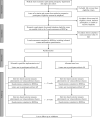Effectiveness of a guideline implementation tool for supporting management of mental health complications after mild traumatic brain injury in primary care: protocol for a randomised controlled trial
- PMID: 35728892
- PMCID: PMC9214410
- DOI: 10.1136/bmjopen-2022-062527
Effectiveness of a guideline implementation tool for supporting management of mental health complications after mild traumatic brain injury in primary care: protocol for a randomised controlled trial
Abstract
Introduction: Mental health problems frequently interfere with recovery from mild traumatic brain injury (mTBI) but are under-recognised and undertreated. Consistent implementation of clinical practice guidelines for proactive detection and treatment of mental health complications after mTBI will require evidence-based knowledge translation strategies. This study aims to determine if a guideline implementation tool can reduce the risk of mental health complications following mTBI. If effective, our guideline implementation tool could be readily scaled up and/or adapted to other healthcare settings.
Methods and analysis: We will conduct a triple-blind cluster randomised trial to evaluate a clinical practice guideline implementation tool designed to support proactive management of mental health complications after mTBI in primary care. We will recruit 535 adults (aged 18-69 years) with mTBI from six emergency departments and two urgent care centres in the Greater Vancouver Area, Canada. Upon enrolment at 2 weeks post-injury, they will complete mental health symptom screening tools and designate a general practitioner (GP) or primary care clinic where they plan to seek follow-up care. Primary care clinics will be randomised into one of two arms. In the guideline implementation tool arm, GPs will receive actionable mental health screening test results tailored to their patient and their patients will receive written education about mental health problems after mTBI and treatment options. In the usual care control arm, GPs and their patients will receive generic information about mTBI. Patient participants will complete outcome measures remotely at 2, 12 and 26 weeks post-injury. The primary outcome is rate of new or worsened mood, anxiety or trauma-related disorder on the Mini International Neuropsychiatric Interview at 26 weeks.
Ethics and dissemination: Study procedures were approved by the University of British Columbia's research ethics board (H20-00562). The primary report for the trial results will be published in a peer-reviewed journal. Our knowledge user team members (patients, GPs, policymakers) will co-create a plan for public dissemination.
Trial registration number: ClinicalTrials.gov Registry (NCT04704037).
Keywords: Clinical trials; Depression & mood disorders; Neurological injury; PRIMARY CARE; Protocols & guidelines; REHABILITATION MEDICINE.
© Author(s) (or their employer(s)) 2022. Re-use permitted under CC BY-NC. No commercial re-use. See rights and permissions. Published by BMJ.
Conflict of interest statement
Competing interests: NS has a private neuropsychological consulting practice and has received honoraria for providing continuing medical education. The other authors have no potential conflicts to declare.
Figures
References
Publication types
MeSH terms
Associated data
LinkOut - more resources
Full Text Sources
Medical

